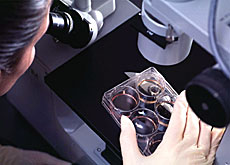
Stem-cell research approved – with conditions

Stem-cell research on embryos has been approved in Switzerland, paving the way for using fertilised eggs left over from in-vitro fertilisation.
But the new law governing this controversial area of scientific research bans the production of human organisms from non-fertilised eggs.
On Thursday, the Senate ironed out its differences with the House of Representatives to approve the draft law.
It contains a prohibition on developing unfertilised human eggs for the purposes of stem-cell research.
This was one area where the two chambers of parliament had disagreed in the past. In the end, the Senate decided to accept the House of Representatives’ proposal.
It had been argued that using unfertilised eggs risked coming close to cloning, which is forbidden by the Swiss constitution.
The new legislation will prevent the trade in embryos and their development for research purposes. Furthermore, stem cells can only be used from organisms that are up to seven days old.
Frozen embryos
The bill also deals with surplus frozen embryos created for artificial insemination, which were saved from destruction earlier this year, when the House voted against destroying them at the end of 2003.
The current law on artificial fertilisation required that these embryos – which date from before 2001 – had to be destroyed at the end of 2003.
They have been effectively granted a period of grace that will now last until 2005.
The Senate decided that embryos could be used for research purposes until 2008, providing that the couples concerned consented.
An important proviso in the law says that, before stem cells can be extracted from embryos, there is a duty to ensure that suitable stem cells are not already available.
Scientists will be expected to demonstrate that using embryonic cells is the only option open to them.
European Union
With this law Switzerland has gone further than some of its neighbours in allowing embryonic research.
Within the European Union, member states are currently divided over whether to allow stem-cell research with embryos to take place across the board.
While the European institutions, such as the Commission, have thrown their weight behind a liberal policy in the interests of creating high-quality research, countries including Germany remain unsure.
According to German law, such research can only take place within a very tight framework.
Working with human embryos risks punishment and only imported stem cells taken from embryos pre-2002 can be used.
swissinfo with agencies
Stem cells are cells that renew themselves for long periods through cell division.
Under certain conditions, they can be induced to become cells with special functions such as the beating cells of the heart muscle or the insulin-producing cells of the pancreas.
It is thought that stem cells may, in the future, become the basis for treating diseases such as Parkinson’s disease, diabetes, and heart disease.
The two chambers of the Swiss parliament have agreed on a new law, regulating research on stem cell from embryos.
Only surplus embryos left over from in-vitro fertilisation can be used, with the consent of the couples concerned.

In compliance with the JTI standards
More: SWI swissinfo.ch certified by the Journalism Trust Initiative
















![The four-metre-long painting "Sonntag der Bergbauern" [Sunday of the Mountain Farmers, 1923-24/26] had to be removed by a crane from the German Chancellery in Berlin for the exhibition in Bern.](https://www.swissinfo.ch/content/wp-content/uploads/sites/13/2025/12/01_Pressebild_KirchnerxKirchner.jpg?ver=cb688ed5)














You can find an overview of ongoing debates with our journalists here . Please join us!
If you want to start a conversation about a topic raised in this article or want to report factual errors, email us at english@swissinfo.ch.